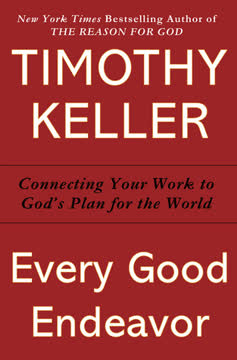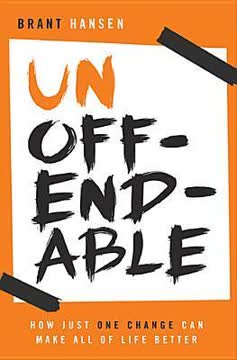Key Takeaways
1. God builds faith by calling us to believe Him anyway, even in impossible circumstances.
By faith Abraham, when called to go to a place he would later receive as his inheritance, obeyed and went, even though he did not know where he was going.
Faith in the unseen. God often calls men to step into unknown territory or wait far longer than seems reasonable, testing their faith in His promises over visible reality. Abraham left his comfortable life for an unknown land and waited 25 years for the promised son, Isaac, demonstrating belief in the face of seemingly impossible circumstances. This process strengthens faith.
Thinking in Bible Time. Our perception of time is limited, leading to impatience and doubt when God's promises aren't immediately fulfilled. Abraham's 25-year wait for Isaac and the Israelites' 470-year journey to the Promised Land (430 in Egypt, 40 in wilderness) highlight God's elastic timeline. Embracing "Bible Time" helps manage expectations and persevere, trusting God's perfect timing.
Ultimate surrender. The ultimate test of faith is being willing to give God the one thing you most want to keep, as Abraham was asked to sacrifice Isaac. This test reveals whether we trust God completely, even with our most cherished possessions or relationships. Passing this test, like Abraham did, demonstrates radical faith and allows God to work in powerful ways.
2. God shapes men by orchestrating even the toughest circumstances for a greater good.
So then, it was not you who sent me here, but God.
Purpose in pain. Nothing that happens to us by human decision can ever happen apart from the will of God, who orchestrates even the toughest circumstances for a greater good. Joseph's story, from being sold into slavery by his brothers to imprisonment, illustrates how God used betrayal and injustice to position him to save his family and a nation from famine. His suffering had a divine purpose.
Meticulous providence. God's meticulous providence means He allows no evil except that which prevents a greater evil or brings about a greater good. This doctrine assures us that even when life feels out of control or God seems distant, He is sovereignly at work. Joseph's eventual understanding that God sent him ahead for salvation brought meaning and peace to his decades of suffering.
Showcase for glory. God uses our trials and suffering, not just for our good, but to put His power and glory on display. Like the man born blind so God's work could be shown, our lives, even in brokenness, can be a showcase for God's redemptive power. This perspective transforms pain into purpose, enabling forgiveness and reconciliation, as seen in Joseph's response to his brothers.
3. God changes a man's character through a humbling process of personal transformation.
Now Moses was a very humble man, more humble than anyone else on the face of the earth.
Went before sent. Men often have noble dreams or feel called by God but act prematurely in their own strength and wisdom, leading to failure and frustration. Moses, confident at age 40, tried to deliver Israel by killing an Egyptian, only to be rejected and flee into the wilderness for 40 years. His early stumble was a result of acting before God's timing.
Character College. God uses prolonged wilderness experiences and humbling circumstances to fundamentally change the way we think and act. Moses's 40 years tending sheep in Midian stripped away his pride and self-reliance, making him "very humble." This period wasn't abandonment but equipping, preparing him to lead Israel through their own 40-year wilderness journey.
Humility precedes opportunity. God is more interested in the success of our character than our circumstances, and He will never sacrifice our character to improve our situation. Humbling us allows us to realize our inadequacy and depend utterly on Him. Like Moses, who felt inadequate after his wilderness training, God often calls those who feel weakest, demonstrating that His power is perfected in our weakness.
4. God turns a man's fear and weakness into strength, making him an unexpected leader.
The LORD said to him, “I will be with you.”
Unlikely candidates. God often chooses the most unexpected men for His greatest tasks, turning their perceived weaknesses into platforms for His strength. Gideon, hiding and feeling like the weakest man from the weakest clan, was called a "mighty warrior" by God. His doubts and requests for signs highlight his reluctance, making God's choice counterintuitive by human standards.
Majority of two. When God calls a man, His promise "I will be with you" means that God and that man constitute a majority in any situation, regardless of overwhelming odds. Gideon's army was reduced from 32,000 to 300 against 135,000 Midianites, ensuring that victory would clearly be God's doing, not human strength. This demonstrates that God is not limited by our weakness.
Strength in weakness. God delights in using the weak things of the world to shame the strong, ensuring that only He gets the glory. Our failures and vulnerabilities are often the very areas God uses to forge our ministry and impact. By identifying what we are doing with God, like Gideon shouting "For the LORD and for Gideon!", we declare that the battle is His, making it impossible for enemies to prevail without first prevailing against God.
5. God rescues men when they go astray by doing whatever it takes for correction and restoration.
David said to Nathan, “I have sinned against the LORD.”
From hero to asterisk. Even men after God's own heart, like King David, can fall into grievous sin when they are where they shouldn't be and yield to temptation. David's adultery with Bathsheba and murder of Uriah, though forgiven upon repentance, resulted in severe, lifelong consequences for his family and legacy. Sin has a high price.
Forgiveness and consequences. God's grace means forgiveness is available for any sin upon repentance, but it does not negate the temporal consequences of our actions. David's family suffered tragedy after tragedy as a direct result of his sin. God's discipline, though painful, is an act of love, designed to correct us and prevent self-destruction, forcing us back to Him.
Steps to restoration. When we go astray, God initiates a process of correction and restoration, often through conviction by the Holy Spirit, confrontation (sometimes through others), and suffering consequences. Repentance, a broken and contrite heart, is the necessary response. Guarding our hearts through God's Word and accountability with other men are crucial for preventing future stumbles and living a life of obedience.
6. God shows men the true path to happiness by making lasting fulfillment impossible apart from Him.
“Meaningless! Meaningless!” says the Teacher. “Utterly meaningless! Everything is meaningless.”
The futility of earthly pursuits. King Solomon, possessing unparalleled wisdom, wealth, and power, systematically explored every possible avenue for happiness and meaning apart from God, including pleasure, work, knowledge, and possessions. His conclusion: "everything was meaningless, a chasing after the wind." Worldly success alone cannot provide lasting satisfaction.
Syncretism's trap. Trying to blend faith in God with the pursuit of worldly idols (like sex, money, power, or reputation) leads to a divided heart and ultimately, emptiness. Solomon's downfall was partly due to his many foreign wives turning his heart to other gods. God makes it impossible to find lasting happiness apart from Him because if we could, we would, and then we wouldn't revere Him.
Fear God and keep His commandments. Solomon's hard-won conclusion, after decades of searching, is that the whole duty of man is to "Fear God and keep his commandments." True, lasting happiness and meaning are found only in a life centered on God, not in the accumulation of worldly success. God, in His grace, frustrates our idols to draw us back to Himself.
7. God calls men to action by turning what breaks their hearts into a passionate calling.
When I heard these things, I sat down and wept. For some days I mourned and fasted and prayed before the God of heaven.
The weight of a burden. God often reveals a passionate calling by allowing us to see and feel the pain of a broken part of His world so deeply that it breaks our hearts. Nehemiah, upon hearing of Jerusalem's ruined walls and his people's disgrace, was moved to weep, mourn, fast, and pray. This deep sorrow was the catalyst for his calling.
Repentance precedes vision. The process of responding to a burden begins with humble repentance, acknowledging our own and our community's sin and disobedience. Nehemiah's prayer confessed the sins of his people, including himself. This act of humility sets the stage for God to grant a vision and empower action to redeem what is broken.
You are the plan. God's plan to redeem the world often involves selecting specific men, giving them a burden, preparing them, and providing what's needed to act as His agents of change. Nehemiah's vision to rebuild the wall, his request to the king, and God's favor ("the gracious hand of my God was upon me") illustrate this. Identifying what makes you weep reveals where God wants to use you to make a difference.
8. God molds men through suffering, allowing us to gain what can be gained no other way.
[God] knows the way that I take; when he has tested me, I will come forth as gold.
Suffering's mystery. Suffering for no apparent reason is a profound challenge to faith, making us question God's knowledge, care, and power. Job's unimaginable losses—wealth, children, health, and even his wife's support—illustrate suffering's depth. While we may not understand the "why" behind specific trials, the Bible assures us suffering is part of God's plan.
Hearing God in brokenness. Suffering can strip away our self-reliance and worldly props, leaving us with nowhere to turn but God. Job's encounter with God after his trials led him to a deeper knowledge and awe of God ("My ears had heard of you but now my eyes have seen you"). Suffering allows us to hear God's voice in a way often only audible to the brokenhearted.
Redemption and gain. The Bible contains no instances of meaningless suffering; God always works for a greater good, even if the reason remains hidden. Suffering develops perseverance, character, and hope; displays God's work and glory; and allows us to comfort others. While suffering is painful, God promises to restore and make us strong, firm, and steadfast, ensuring that what is gained through it is precious and could be gained no other way.
9. God equips men to reach other men by a process of calling, equipping, and sending disciples.
When they saw the courage of Peter and John and realized that they were unschooled, ordinary men, they were astonished and they took note that these men had been with Jesus.
The Great Commission. Making disciples is God's designated method for releasing the power of His gospel and addressing the moral decay in our culture. Jesus' command to "Go and make disciples" is a moral imperative for every Christian. Failure to disciple, starting at home, contributes to the "men problem" and its devastating consequences for families and society.
Calling, equipping, sending. Jesus' simple plan was to call ordinary men (like Peter) to be with Him in authentic relationships, equipping them through life-on-life interaction, teaching, and practice. This process transformed them into men capable of extraordinary ministries. Being "with Jesus" is the core of equipping, changing how we think and act.
Extraordinary ministries. Equipped men are sent to repeat the process, making disciples who will make disciples (spiritual multiplication). Peter, an unschooled fisherman, became a pillar of the early church, performing miracles and leading thousands to Christ because he had been trained by the Master. Discipleship starts at home (wife, children) and extends to others, especially younger men who need models of biblical manhood.
10. God empowers men to fully follow Christ by forging them into humble, surrendered servants.
I have been crucified with Christ and I no longer live, but Christ lives in me. The life I live in the body, I live by faith in the Son of God, who loved me and gave himself for me.
Gratitude from grace. Paul's relentless passion for Christ stemmed from his profound gratitude for the grace shown to him, "the worst of sinners." His dramatic conversion from persecutor to apostle demonstrated God's unlimited patience and mercy. Understanding that we don't get what we deserve, but receive grace, is the foundation for a life sold out to Christ.
The awe gap. Spiritual growth involves a widening gap between our increasing understanding of God's greatness and our decreasing estimate of ourselves. This "awe gap" leads to humility and reverence, making the demanding teachings of Jesus (like taking up our cross and giving up everything) begin to make sense and become desirable.
Seeking the God who is. The turning point for full surrender often comes through a crisis that compels us to stop seeking the God we want (one who serves our ambitions) and start seeking the God who is (the sovereign Lord). This humbling process forges us into humble servants, increasingly surrendered to Jesus' lordship, willing to go wherever, whenever, and do whatever He asks, finding true life in losing it for Him.
Last updated:
FAQ
1. What is "How God Makes Men" by Patrick Morley about?
- Ten Bible Heroes, Ten Principles: The book explores how God shaped ten well-known men from the Bible, drawing out a unique, proven principle from each of their lives.
- Practical Application for Today: Morley connects these biblical stories to modern men’s struggles, showing how the same principles can transform men today.
- Overcoming Modern Challenges: The book addresses issues like faith, perseverance, failure, calling, suffering, and purpose, offering hope and direction for men facing cultural and personal challenges.
- Mentorship and Transformation: It’s designed as a mentoring guide, encouraging readers to let these biblical men “mentor” them into becoming the men God created them to be.
2. Why should I read "How God Makes Men" by Patrick Morley?
- Relevant to Men’s Lives: The book addresses real-life struggles men face—faith crises, marriage problems, career setbacks, and more—offering biblical wisdom for each.
- Actionable Principles: Each chapter provides a clear, actionable principle that can be applied to daily life, not just abstract theology.
- Encouragement and Hope: Morley’s stories and biblical examples offer encouragement that God can redeem any situation, no matter how flawed or broken.
- Designed for Growth: The book is structured for both personal reading and group discussion, making it a practical tool for spiritual growth and discipleship.
3. What are the key takeaways or main principles from "How God Makes Men"?
- Ten Proven Principles: Each Bible hero illustrates a principle, such as believing God in impossible circumstances (Abraham), perseverance through suffering (Joseph), and the power of surrender (Paul).
- God’s Process is Transformative: God uses challenges, failures, and even suffering to shape men’s character and faith.
- No One is Too Flawed: Every man in the book is deeply imperfect, showing that God works through weakness, not just strength.
- Purpose and Calling: God gives each man a unique calling, often tied to what breaks their heart or where they feel weak, and equips them to make a difference.
4. How does Patrick Morley define "biblical manhood" in "How God Makes Men"?
- Christ-Centered Identity: Biblical manhood is rooted in a man’s relationship with Christ, not in cultural stereotypes or personal achievement.
- Obedience and Surrender: True manhood involves surrendering to God’s will, obeying His Word, and allowing God to shape one’s character.
- Servant Leadership: Men are called to lead by serving—at home, at work, and in the community—reflecting Christ’s example.
- Ongoing Growth: Biblical manhood is a lifelong process of transformation, not a one-time event or achievement.
5. What are the ten epic stories and principles featured in "How God Makes Men" by Patrick Morley?
- Abraham: The Principle of Believing God Anyway—faith in impossible circumstances.
- Joseph: The Principle of a Greater Good—perseverance and trusting God’s sovereignty in suffering.
- Moses: The Principle of Personal Transformation—God changes a man’s character through humility and wilderness experiences.
- Gideon: The Principle of the Unexpected Leader—God turns weakness and fear into strength for His glory.
- David: The Principle of Correction—God rescues and restores men when they go astray.
- Solomon: The Principle of Success That Matters—true happiness is found only in God, not in worldly pursuits.
- Nehemiah: The Principle of a Passionate Calling—God calls men to action through what breaks their hearts.
- Job: The Principle of Suffering for No Apparent Reason—God molds men through suffering that can’t be explained.
- Peter: The Principle of Making Disciples—God equips men to reach and disciple other men.
- Paul: The Principle of a Surrendered Life—God empowers men to fully follow Christ through surrender.
6. How does "How God Makes Men" by Patrick Morley address the problem of suffering and failure?
- Suffering as a Tool: The book teaches that God allows suffering not as punishment, but as a means to grow faith, character, and dependence on Him (see Job’s story).
- Failure is Not Final: Through men like David and Peter, Morley shows that failure is part of the journey, and God uses it to correct, restore, and equip men for greater things.
- Purpose in Pain: Suffering and setbacks are reframed as opportunities for God to display His power and for men to gain what can be gained no other way.
- Encouragement for the Broken: The stories emphasize that no one is too far gone for God’s grace and restoration.
7. What practical advice does Patrick Morley give for applying the principles in "How God Makes Men"?
- Think in "Bible Time": Be patient—God’s timing is often much longer than we expect, and perseverance is key.
- Embrace Weakness: Don’t wait to be strong or perfect; God often calls and uses men in their areas of greatest weakness.
- Seek Community: Engage in small groups or mentoring relationships for accountability, encouragement, and growth.
- Act on Your Burden: Identify what breaks your heart or where you feel called, and take steps to serve or lead in that area, trusting God to provide.
8. How does "How God Makes Men" by Patrick Morley suggest men discover their calling or purpose?
- Follow Your Burden: Pay attention to what breaks your heart or stirs your passion—God often calls men to act where they feel the deepest concern.
- Repentance and Prayer: Start with humble prayer and repentance, asking God to reveal His vision and direction for your life.
- Take Small Steps: Begin with small acts of obedience; God often clarifies calling as you move forward in faith.
- Expect Opposition: Realize that pursuing your calling will likely involve challenges and resistance, but God’s favor and provision will accompany you.
9. What does "How God Makes Men" by Patrick Morley teach about making disciples and spiritual multiplication?
- Discipleship is a Moral Imperative: Making disciples is not optional; it’s a command from Jesus and the solution to many societal problems.
- Relational Model: Discipleship happens best in authentic, life-on-life relationships, as modeled by Jesus with Peter and the Twelve.
- Starts at Home: The first priority is discipling one’s own family before reaching out to others.
- Ordinary Men, Extraordinary Impact: God uses ordinary, even flawed, men to make extraordinary differences when they are willing to be equipped and sent.
10. What are some of the most impactful quotes from "How God Makes Men" by Patrick Morley, and what do they mean?
- "Because God is good, your life will not turn out like you planned." – God’s plans are better than ours, even when life takes unexpected turns.
- "God makes men by showing us how we can believe Him anyway in the face of what seem like impossible circumstances." – Faith is forged in adversity, not comfort.
- "There is a God we want, and there is a God who is. They are not the same God. The turning point of our lives is when we stop seeking the God we want and start seeking the God who is." – True transformation comes from surrendering to God as He truly is, not as we imagine Him.
- "God works through the present and willing, not the absent and able." – Availability and willingness matter more to God than ability or credentials.
11. How can "How God Makes Men" by Patrick Morley be used for group study or mentoring?
- Structured for Groups: The book includes reflection and discussion questions at the end of each chapter, making it ideal for small groups or men’s ministries.
- Ten-Week Format: Morley suggests a ten-week study, focusing on one chapter and principle per week.
- Leader’s Guide Included: Practical tips for facilitating discussion, encouraging participation, and fostering accountability are provided.
- Mentoring Emphasis: The book encourages men to let the ten biblical figures “mentor” them, and to pass on what they learn by discipling others.
12. What is the ultimate promise or "huge promise" of "How God Makes Men" by Patrick Morley?
- Transformation into God’s Man: If you absorb and embrace the ten principles, you can move beyond shallow cultural Christianity to a more authentic, biblical faith.
- Release of God’s Power: You will experience God’s power in every area of your life—faith, family, work, and calling.
- Sustained Passion and Purpose: The book promises that you will know how to sustain the passion of your faith and write your own epic story, becoming the man God created you to be.
- Victory in Life’s Battles: By following these principles, you are equipped to win the spiritual battles men face and to make a lasting impact for God’s glory.
Review Summary
How God Makes Men by Patrick Morley explores how God shapes men's character through biblical examples. Readers appreciate the scriptural focus, practical insights, and discussion questions. Many found it encouraging and helpful for personal growth or men's groups. The book examines ten biblical figures, highlighting principles like faith, perseverance, and surrender. Some critics felt it was repetitive or overly simplistic, but most reviewers praised its biblical grounding and relevance for modern men seeking to deepen their faith and leadership.
Similar Books










Download PDF
Download EPUB
.epub digital book format is ideal for reading ebooks on phones, tablets, and e-readers.





